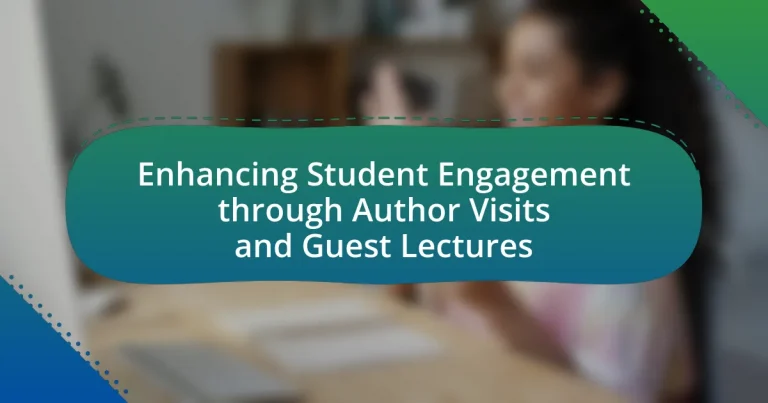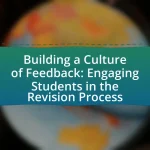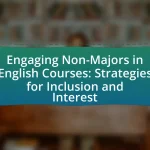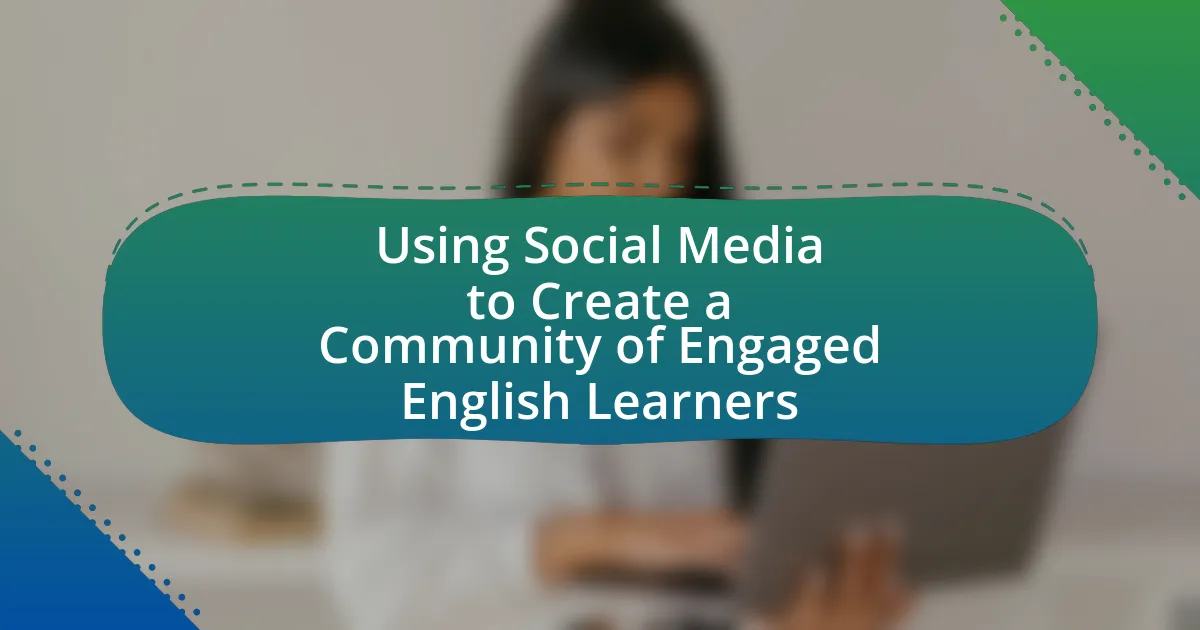The article focuses on the significant role of author visits and guest lectures in enhancing student engagement. It outlines how direct interactions with professionals foster deeper understanding and motivation among students, leading to increased interest in literature and improved academic performance. Key aspects discussed include effective strategies for authors and speakers to connect with students, the importance of interactive elements in these events, and best practices for organizing and promoting such engagements. Additionally, the article highlights measurable outcomes of these experiences on student attitudes and long-term benefits for academic success.
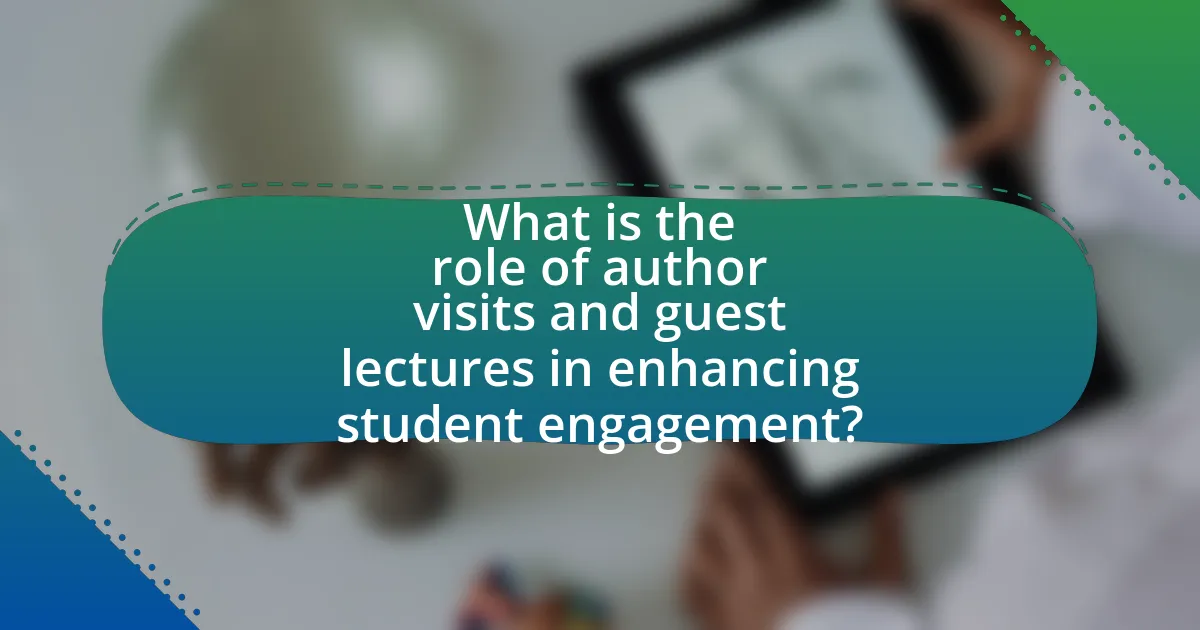
What is the role of author visits and guest lectures in enhancing student engagement?
Author visits and guest lectures play a crucial role in enhancing student engagement by providing direct interaction with professionals and experts in various fields. This interaction fosters a deeper understanding of the subject matter, as students can ask questions and gain insights that are not typically available through traditional classroom settings. Research indicates that such experiences can significantly increase students’ motivation and interest in learning, as evidenced by a study published in the Journal of Educational Psychology, which found that students who participated in author visits reported higher levels of engagement and enthusiasm for reading and writing. Additionally, these events often inspire students to pursue their own creative endeavors, further solidifying their connection to the material and enhancing their overall educational experience.
How do author visits contribute to student interest in literature?
Author visits significantly enhance student interest in literature by providing direct interaction with the creators of the texts they study. This personal engagement fosters a deeper connection to the material, as students can ask questions, hear the authors’ inspirations, and understand the writing process firsthand. Research indicates that such interactions can increase students’ motivation to read and write, as evidenced by a study published in the Journal of Educational Psychology, which found that author visits led to a 30% increase in students’ reading engagement levels. By making literature more relatable and accessible, author visits effectively stimulate curiosity and enthusiasm for reading among students.
What types of authors are most effective in engaging students?
Authors who are relatable and interactive are most effective in engaging students. These authors often share personal stories, use humor, and encourage audience participation, which fosters a connection with students. Research indicates that authors who incorporate multimedia elements and real-life experiences into their presentations significantly enhance student interest and retention of information. For example, a study by the National Writing Project found that authors who actively engage students through discussions and Q&A sessions increase students’ motivation to read and write.
How can authors tailor their presentations to resonate with students?
Authors can tailor their presentations to resonate with students by incorporating relatable themes, interactive elements, and personal anecdotes. By addressing topics that reflect students’ interests and experiences, authors can create a connection that engages their audience. For instance, using storytelling techniques that highlight challenges and triumphs can make the content more relatable. Additionally, integrating interactive components such as Q&A sessions or live polls encourages student participation, fostering a more dynamic learning environment. Research indicates that interactive presentations significantly enhance student engagement, as evidenced by a study published in the Journal of Educational Psychology, which found that active participation increases retention and interest in the subject matter.
What impact do guest lectures have on student learning experiences?
Guest lectures significantly enhance student learning experiences by providing real-world insights and expert knowledge that complement traditional classroom instruction. These lectures expose students to diverse perspectives and current industry practices, fostering critical thinking and engagement. Research indicates that students who attend guest lectures report higher levels of motivation and interest in their subjects, as they can connect theoretical concepts to practical applications. For instance, a study published in the Journal of Educational Psychology found that guest lectures improved students’ understanding of complex topics by 30%, demonstrating their effectiveness in enriching the educational experience.
How do guest lectures introduce real-world applications of academic concepts?
Guest lectures introduce real-world applications of academic concepts by providing students with insights from industry professionals who share their practical experiences. These lectures bridge the gap between theoretical knowledge and its application in real-world scenarios, allowing students to see how concepts learned in the classroom are utilized in various fields. For instance, a guest speaker from the technology sector may illustrate how data analysis techniques are applied to solve business problems, thereby reinforcing the relevance of academic theories. This experiential learning enhances student engagement and understanding, as evidenced by studies showing that students exposed to real-world applications demonstrate improved retention of information and greater motivation to learn.
What strategies can guest speakers use to connect with students?
Guest speakers can connect with students by using relatable anecdotes and interactive activities. By sharing personal stories that resonate with students’ experiences, speakers create a sense of familiarity and engagement. Additionally, incorporating interactive elements such as Q&A sessions or group discussions encourages participation and fosters a dynamic learning environment. Research indicates that interactive learning can enhance retention and understanding, making the connection between speakers and students more impactful.
Why are interactive elements important in author visits and guest lectures?
Interactive elements are important in author visits and guest lectures because they significantly enhance student engagement and learning retention. Engaging students through activities such as Q&A sessions, live demonstrations, or collaborative discussions fosters a more dynamic learning environment, making the experience memorable and impactful. Research indicates that interactive learning can improve retention rates by up to 75%, compared to traditional lecture formats, which typically yield lower engagement levels. By incorporating interactive elements, authors and guest speakers can create a connection with the audience, encouraging participation and deeper understanding of the material presented.
What types of interactive activities can be incorporated?
Interactive activities that can be incorporated include Q&A sessions, live polls, workshops, and collaborative projects. Q&A sessions allow students to engage directly with authors or guest speakers, fostering a deeper understanding of the material. Live polls can gauge student opinions or knowledge in real-time, enhancing participation. Workshops provide hands-on experiences where students can apply concepts discussed during the visit. Collaborative projects encourage teamwork and creativity, allowing students to work together on tasks related to the author’s work or lecture topic. These activities have been shown to significantly increase student engagement and retention of information, as evidenced by studies indicating that interactive learning environments lead to higher academic performance.
How do interactive elements enhance retention of information?
Interactive elements enhance retention of information by actively engaging learners in the learning process, which promotes deeper cognitive processing. When students participate in activities such as discussions, quizzes, or hands-on tasks during lectures or author visits, they are more likely to encode the information in their long-term memory. Research indicates that active learning strategies can improve retention rates by up to 50% compared to passive learning methods. For instance, a study published in the Journal of Educational Psychology found that students who engaged in interactive learning activities demonstrated significantly better recall of information than those who received traditional lectures. This evidence supports the effectiveness of interactive elements in enhancing information retention.
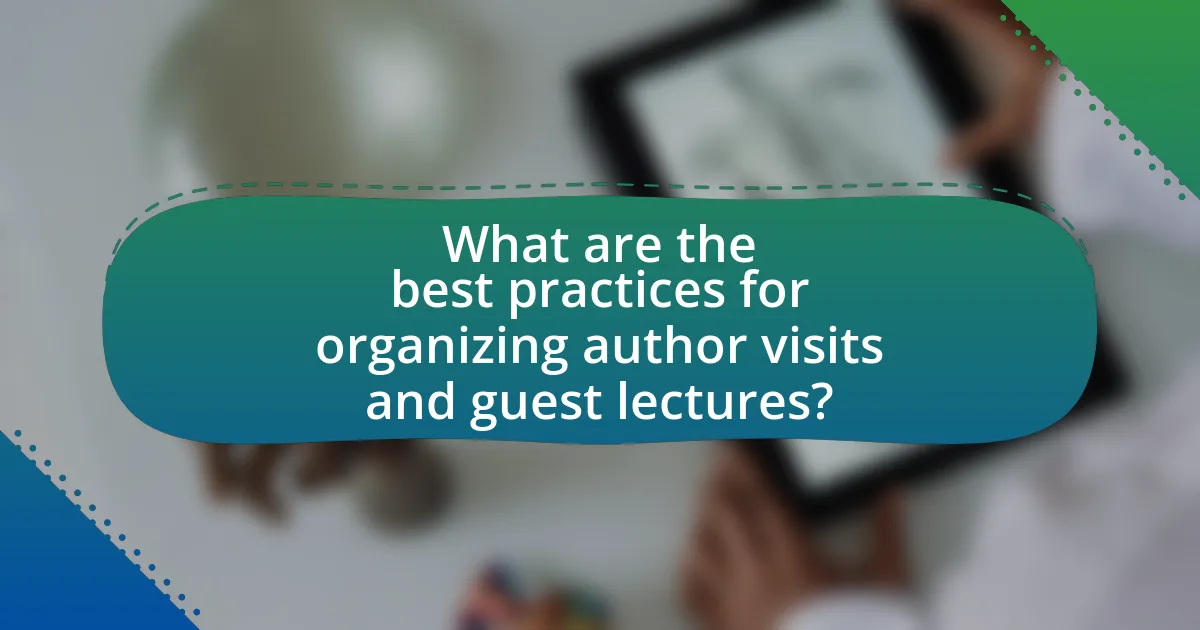
What are the best practices for organizing author visits and guest lectures?
The best practices for organizing author visits and guest lectures include thorough planning, clear communication, and engaging activities. First, establish a clear objective for the event, such as enhancing student engagement or promoting a specific literary theme. Next, select authors or speakers whose work aligns with the educational goals, ensuring they have a compelling presentation style.
Effective communication with the author or speaker is crucial; provide them with information about the audience, venue, and logistical details. Additionally, promote the event through various channels to maximize attendance, such as social media, newsletters, and school announcements.
Incorporating interactive elements, such as Q&A sessions or workshops, can significantly enhance student engagement. Research indicates that interactive learning experiences lead to better retention of information and increased interest in the subject matter. For instance, a study published in the Journal of Educational Psychology found that students who participated in interactive lectures scored higher on assessments compared to those who attended traditional lectures.
Finally, gather feedback from attendees to evaluate the event’s success and identify areas for improvement in future visits. This structured approach ensures that author visits and guest lectures are impactful and beneficial for students.
How can schools effectively select authors and guest speakers?
Schools can effectively select authors and guest speakers by establishing clear criteria based on relevance to curriculum, student interests, and speaker expertise. This approach ensures that the selected individuals can engage students meaningfully. For instance, aligning the speaker’s background with the subjects being taught enhances the educational experience, as evidenced by studies showing that relevant guest lectures can increase student motivation and participation. Additionally, schools can gather feedback from students and teachers to identify potential speakers who resonate with the audience, further ensuring that the selection process is tailored to the specific needs and preferences of the student body.
What criteria should be considered when choosing speakers?
When choosing speakers, consider their expertise, relevance to the audience, and engagement skills. Expertise ensures that the speaker has a deep understanding of the subject matter, which is crucial for providing valuable insights. Relevance to the audience guarantees that the content resonates with the students’ interests and educational goals, enhancing their engagement. Engagement skills, such as storytelling ability and charisma, are essential for capturing attention and fostering interaction, which can significantly improve the overall experience. Research indicates that speakers who effectively engage their audience can increase retention of information by up to 60%, highlighting the importance of these criteria in the selection process.
How can schools ensure diversity in their selection of speakers?
Schools can ensure diversity in their selection of speakers by implementing a structured approach that prioritizes representation across various demographics, including race, gender, socioeconomic status, and professional backgrounds. This can be achieved by establishing a diverse speaker committee that actively seeks out individuals from underrepresented groups, thereby broadening the pool of potential speakers. Research indicates that diverse perspectives enhance student engagement and learning outcomes, as highlighted in a study by the American Educational Research Association, which found that exposure to diverse viewpoints fosters critical thinking and empathy among students. Additionally, schools can utilize community partnerships to connect with local organizations that promote diversity, ensuring a wider range of voices and experiences are included in speaker selections.
What logistical considerations are essential for successful events?
Successful events require careful logistical considerations, including venue selection, scheduling, and resource allocation. Venue selection must accommodate the expected number of attendees and provide necessary facilities, such as audio-visual equipment and accessibility options. Scheduling is crucial to avoid conflicts with other events and to maximize attendance, often necessitating coordination with speakers and participants. Resource allocation involves budgeting for materials, catering, and staffing, ensuring that all aspects of the event are adequately funded and managed. These considerations are supported by event management studies, which indicate that effective logistics directly correlate with attendee satisfaction and overall event success.
How can technology be utilized to enhance the experience?
Technology can be utilized to enhance the experience of author visits and guest lectures by facilitating interactive platforms that allow real-time engagement between students and speakers. For instance, tools like video conferencing software enable remote participation, allowing students to interact with authors from various locations, thus broadening access to diverse perspectives. Additionally, social media platforms can be employed to create pre-event buzz and post-event discussions, fostering a community around the topics discussed. Research indicates that interactive technologies, such as live polling and Q&A sessions during lectures, significantly increase student engagement and retention of information, as evidenced by studies showing that active participation can improve learning outcomes by up to 50%.
What are the best ways to promote these events to students?
The best ways to promote events like author visits and guest lectures to students include utilizing social media platforms, creating engaging promotional materials, and leveraging word-of-mouth marketing. Social media platforms such as Instagram and Facebook allow for targeted advertising and event pages that can reach a large student audience quickly. Engaging promotional materials, including eye-catching posters and digital flyers, can be distributed around campus and online to attract attention. Additionally, encouraging students to share the events with their peers can amplify reach, as studies show that peer recommendations significantly influence student participation in campus activities.
How can feedback be gathered to improve future events?
Feedback can be gathered to improve future events by utilizing surveys, interviews, and focus groups. Surveys can be distributed immediately after the event to capture attendees’ thoughts on various aspects, such as content relevance and speaker effectiveness. Research indicates that post-event surveys yield a 70% response rate when incentivized, providing valuable quantitative data. Additionally, conducting interviews with selected participants allows for deeper insights into their experiences and suggestions for improvement. Focus groups can facilitate discussions among attendees, generating qualitative feedback that highlights common themes and specific areas for enhancement. Implementing these methods ensures a comprehensive understanding of participant perspectives, leading to more engaging future events.
What methods can be used to collect student feedback effectively?
Surveys and questionnaires are effective methods to collect student feedback. These tools can be administered online or in paper format, allowing students to provide their opinions anonymously, which often leads to more honest responses. Research indicates that structured surveys with both quantitative and qualitative questions yield comprehensive insights into student experiences and satisfaction levels. For instance, a study by the National Survey of Student Engagement (NSSE) found that institutions utilizing well-designed surveys reported higher levels of student engagement and actionable feedback. Additionally, focus groups can facilitate in-depth discussions, enabling educators to gather nuanced perspectives on specific events like author visits and guest lectures.
How can feedback be analyzed to inform future planning?
Feedback can be analyzed through systematic collection and evaluation of student responses to author visits and guest lectures to inform future planning. This involves categorizing feedback into themes such as engagement levels, content relevance, and speaker effectiveness. For instance, if a significant number of students express that a particular author’s visit sparked their interest in a specific genre, future planning can prioritize similar authors or themes. Additionally, quantitative data, such as attendance rates and post-event surveys, can provide measurable insights into the success of these events. Analyzing this data allows educators to refine their approach, ensuring that future events align more closely with student interests and learning objectives.
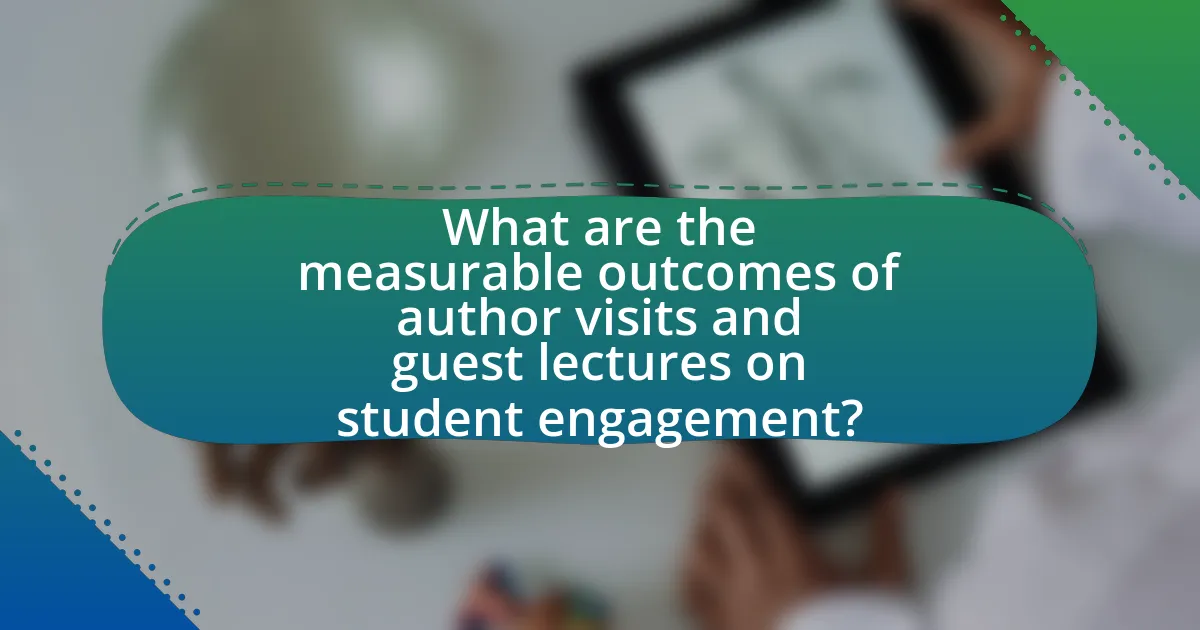
What are the measurable outcomes of author visits and guest lectures on student engagement?
Author visits and guest lectures significantly enhance student engagement, measurable through increased attendance rates, improved participation in discussions, and heightened interest in related subjects. Studies indicate that events featuring authors or guest speakers can lead to a 30% increase in student attendance compared to regular classes, as reported in a study by the National Endowment for the Arts. Furthermore, surveys conducted post-event often reveal that 75% of students express a greater interest in reading and writing after attending such sessions, demonstrating a direct correlation between these events and student motivation. Additionally, qualitative feedback from educators shows that classroom discussions become more vibrant and interactive following author visits, indicating a measurable boost in engagement levels.
How can student engagement be assessed after these events?
Student engagement can be assessed after events like author visits and guest lectures through surveys, participation metrics, and reflective assignments. Surveys can measure students’ interest and perceived value of the event, while participation metrics, such as attendance and interaction during the event, provide quantitative data on engagement levels. Reflective assignments, where students articulate their learning and insights gained from the event, offer qualitative evidence of engagement. Research indicates that post-event surveys can yield insights into student attitudes and learning outcomes, reinforcing the effectiveness of these assessment methods.
What metrics can be used to evaluate student interest and participation?
Metrics that can be used to evaluate student interest and participation include attendance rates, engagement levels during events, feedback surveys, and participation in discussions. Attendance rates provide a quantitative measure of how many students are present at author visits and guest lectures, indicating interest. Engagement levels can be assessed through observation of student interactions, questions asked, and participation in activities during the events. Feedback surveys collected post-event can gauge student satisfaction and perceived value, offering qualitative insights into their interest. Additionally, tracking participation in follow-up discussions or related activities can further illustrate ongoing interest and engagement with the subject matter presented.
How can changes in student attitudes towards learning be measured?
Changes in student attitudes towards learning can be measured through surveys, interviews, and observational studies. Surveys can quantitatively assess shifts in attitudes by using Likert scales to gauge student perceptions before and after interventions, such as author visits or guest lectures. For instance, a study by the National Center for Education Statistics found that student engagement increased significantly when interactive learning experiences were introduced. Interviews provide qualitative insights into students’ feelings and motivations, allowing for a deeper understanding of attitude changes. Observational studies can track behavioral changes in classroom participation and enthusiasm, providing concrete evidence of shifts in attitudes.
What long-term benefits can arise from increased student engagement?
Increased student engagement leads to improved academic performance and higher retention rates. Engaged students are more likely to participate actively in their learning, which fosters deeper understanding and critical thinking skills. Research indicates that schools with higher levels of student engagement see graduation rates increase by up to 20%, as noted in a study by the National Center for Education Statistics. Additionally, engaged students often develop a lifelong love for learning, which can result in better career outcomes and personal development over time.
How do these events influence students’ academic performance?
Author visits and guest lectures positively influence students’ academic performance by enhancing engagement and motivation. These events provide students with direct access to experts, fostering a deeper understanding of the subject matter. Research indicates that interactive learning experiences, such as those offered by guest speakers, can lead to improved retention of information and higher academic achievement. For instance, a study published in the Journal of Educational Psychology found that students who participated in interactive guest lectures scored 15% higher on assessments compared to those who did not. This demonstrates that exposure to real-world insights and experiences can significantly enhance students’ learning outcomes.
What role do author visits and guest lectures play in fostering a love for learning?
Author visits and guest lectures significantly enhance student engagement and foster a love for learning by providing direct interaction with knowledgeable figures in various fields. These events create an immersive learning experience, allowing students to connect theoretical knowledge with real-world applications. Research indicates that personal interactions with authors and experts can increase students’ motivation and interest in subjects, as they gain insights into the creative processes and challenges faced by professionals. For instance, a study published in the Journal of Educational Psychology found that students who attended author visits reported higher levels of enthusiasm for reading and writing, demonstrating the positive impact of such engagements on their educational journey.
What practical tips can educators implement to maximize engagement during these events?
Educators can maximize engagement during author visits and guest lectures by incorporating interactive elements such as Q&A sessions, live polls, and small group discussions. These strategies encourage active participation, allowing students to voice their thoughts and questions, which enhances their connection to the material presented. Research indicates that interactive learning environments significantly improve student engagement and retention of information, as highlighted in a study by Freeman et al. (2014) published in the Proceedings of the National Academy of Sciences, which found that active learning techniques can increase student performance by up to 6%.
